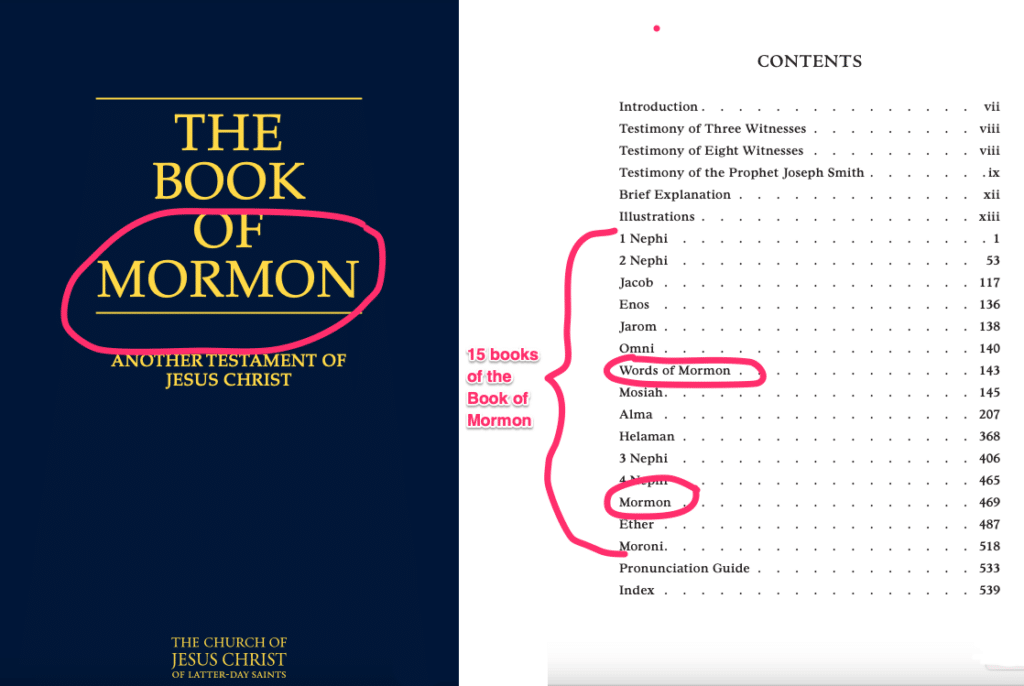Table of Contents
Who was Mormon?
We’ve been reading the Book of Mormon all year, but now we’re taking that one step further and reading Mormon’s book within the Book of Mormon, which is also called the Book of Mormon. The Book of Mormon (the whole thing) is named for Mormon because he is the person who gathered all the Nephite records together and condensed them into one big book. We first meet Mormon in the 7th book of the Book of Mormon, which is called Words of Mormon because having two little books named Mormon compiled into a big book named Mormon is not confusing at all. That’s where Mormon introduces himself as the editor of the Nephite records and starts narrating. We hear his voice as he narrates the Books of Mosiah, Alma, Helaman, 3 Nephi and 4 Nephi. These books move us chronologically forward through time until we get to Mormon’s own lifetime, which is documented in the 13th book of the Book of Mormon and named Book of Mormon. In this book, Mormon tells his own life story with a first person narration.
Clear as mud? Good. Now try saying that three times fast like a tongue twister. Don’t trip on the word Mormon.

Mormon prepared for leadership when he was just a kid.
In Mormon 1, we learn about Mormon’s early life as a child prodigy. He was selected to become the Nephite record keeper at the wee age of 10 and was working as a Nephite general by the time he was 16 years old.
While most of us will never be prodigies, all of us can follow the example of Jesus Christ as we mature from childhood to adulthood, and even as we set goals for self-improvement as adults. The scriptures teach that when Jesus was a child, he progressed intellectually, physically, spiritually and socially:
52 And Jesus increased in wisdom and stature, and in favour with God and man.
Luke 2:52
As you read these scriptures about Mormon’s childhood, consider how he followed the example of Jesus.
- How did he progress intellectually?
- Physically?
- Spiritually?
- Socially?
2 And about the time that Ammaron hid up the records unto the Lord, he came unto me, (I being about ten years of age, and I began to be learned somewhat after the manner of the learning of my people) and Ammaron said unto me: I perceive that thou art a sober child, and art quick to observe;
3 Therefore, when ye are about twenty and four years old I would that ye should remember the things that ye have observed concerning this people; and when ye are of that age go to the land Antum, unto a hill which shall be called Shim; and there have I deposited unto the Lord all the sacred engravings concerning this people.
Mormon 1:2-3
- What do you think it means to be “sober” in this context?
- What do you think made Mormon a good observer? How can we be better observers?
15 And I, being fifteen years of age and being somewhat of a sober mind, therefore I was visited of the Lord, and tasted and knew of the goodness of Jesus.
16 And I did endeavor to preach unto this people, but my mouth was shut, and I was forbidden that I should preach unto them; for behold they had wilfully rebelled against their God; and the beloved disciples were taken away out of the land, because of their iniquity.
17 But I did remain among them, but I was forbidden to preach unto them, because of the hardness of their hearts; and because of the hardness of their hearts the land was cursed for their sake.
Mormon 1:15-17
- How do we “taste” the goodness of Jesus?
- Why is it sometimes important to “remain among” people who may not share our beliefs, without seeking to convert them?
1 And it came to pass in that same year there began to be a war again between the Nephites and the Lamanites. And notwithstanding I being young, was large in stature; therefore the people of Nephi appointed me that I should be their leader, or the leader of their armies.
Mormon 2:1
12 Behold, I had led them, notwithstanding their wickedness I had led them many times to battle, and had loved them, according to the love of God which was in me, with all my heart; and my soul had been poured out in prayer unto my God all the day long for them; nevertheless, it was without faith, because of the hardness of their hearts.
Mormon 3:12
- How can we maintain good relationships with people who may not share our beliefs?

Bad times did not lead to humility for Mormon’s people.
We often read scriptures in which hard times lead people to become more humble, repent, and improve their situations. Unfortunately, that was not the case for the Nephites of Mormon’s time.
10 And it came to pass that the Nephites began to repent of their iniquity, and began to cry even as had been prophesied by Samuel the prophet; for behold no man could keep that which was his own, for the thieves, and the robbers, and the murderers, and the magic art, and the witchcraft which was in the land.
11 Thus there began to be a mourning and a lamentation in all the land because of these things, and more especially among the people of Nephi.
12 And it came to pass that when I, Mormon, saw their lamentation and their mourning and their sorrow before the Lord, my heart did begin to rejoice within me, knowing the mercies and the long-suffering of the Lord, therefore supposing that he would be merciful unto them that they would again become a righteous people.
13 But behold this my joy was vain, for their sorrowing was not unto repentance, because of the goodness of God; but it was rather the sorrowing of the damned, because the Lord would not always suffer them to take happiness in sin.
14 And they did not come unto Jesus with broken hearts and contrite spirits, but they did curse God, and wish to die. Nevertheless they would struggle with the sword for their lives.
Mormon 2:10-14
- Why didn’t the trials the Nephites experienced lead to humility and repentance?
- How can we experience personal growth during times of trial? What attitudes and behaviors should we cultivate, and which should we avoid?
Consider this contrasting example from a more repentant people.
9 Now I rejoice, not that ye were made sorry, but that ye sorrowed to repentance: for ye were made sorry after a godly manner, that ye might receive damage by us in nothing.
10 For godly sorrow worketh repentance to salvation not to be repented of: but the sorrow of the world worketh death.
11 For behold this selfsame thing, that ye sorrowed after a godly sort, what carefulness it wrought in you, yea, what clearing of yourselves, yea, what indignation, yea, what fear, yea, what vehement desire, yea, what zeal, yea, what revenge! In all things ye have approved yourselves to be clear in this matter.
2 Corinthians 7:9-11
- What are the differences between godly sorrow and worldly sorrow?
Divine discontent comes when we compare “what we are [to] what we have the power to become.” Each of us, if we are honest, feels a gap between where and who we are, and where and who we want to become. We yearn for greater personal capacity. We have these feelings because we are daughters and sons of God, born with the Light of Christ yet living in a fallen world. These feelings are God given and create an urgency to act.
We should welcome feelings of divine discontent that call us to a higher way, while recognizing and avoiding Satan’s counterfeit—paralyzing discouragement. This is a precious space into which Satan is all too eager to jump. We can choose to walk the higher path that leads us to seek for God and His peace and grace, or we can listen to Satan, who bombards us with messages that we will never be enough: rich enough, smart enough, beautiful enough, anything enough. Our discontent can become divine—or destructive.
…Divine discontent leads to humility, not to self-pity or the discouragement that comes from making comparisons in which we always come up short.
“Divine Discontent” Michelle D. Craig, First Counselor in the Young Women General Presidency, October 2018
- How can we cultivate humility?
- How can we avoid discouragement?
Good times did not lead to gratitude for Mormon’s people.
3 And I did cry unto this people, but it was in vain; and they did not realize that it was the Lord that had spared them, and granted unto them a chance for repentance. And behold they did harden their hearts against the Lord their God.
Mormon 3:3
9 And now, because of this great thing which my people, the Nephites, had done, they began to boast in their own strength, and began to swear before the heavens that they would avenge themselves of the blood of their brethren who had been slain by their enemies.
Mormon 3:9
- Why didn’t the Nephites acknowledge how God had blessed them?
- Why is it important to acknowledge God’s influence?
I wrote down a few lines every day for years. I never missed a day no matter how tired I was or how early I would have to start the next day. Before I would write, I would ponder this question: “Have I seen the hand of God reaching out to touch us or our children or our family today?” As I kept at it, something began to happen. As I would cast my mind over the day, I would see evidence of what God had done for one of us that I had not recognized in the busy moments of the day. As that happened, and it happened often, I realized that trying to remember had allowed God to show me what He had done.
More than gratitude began to grow in my heart. Testimony grew. I became ever more certain that our Heavenly Father hears and answers prayers. I felt more gratitude for the softening and refining that come because of the Atonement of the Savior Jesus Christ. And I grew more confident that the Holy Ghost can bring all things to our remembrance—even things we did not notice or pay attention to when they happened.
…My point is to urge you to find ways to recognize and remember God’s kindness. It will build our testimonies. You may not keep a journal. You may not share whatever record you keep with those you love and serve. But you and they will be blessed as you remember what the Lord has done.
“O Remember, Remember” Henry B. Eyring, Second Counselor in the First Presidency, October 2007
- How can we better recognize God’s blessings in our lives?
- How can we cultivate gratitude?






One Response
This are great ideas – thank you so much for this! It’s going to be a huge help as I plan my lesson outline.